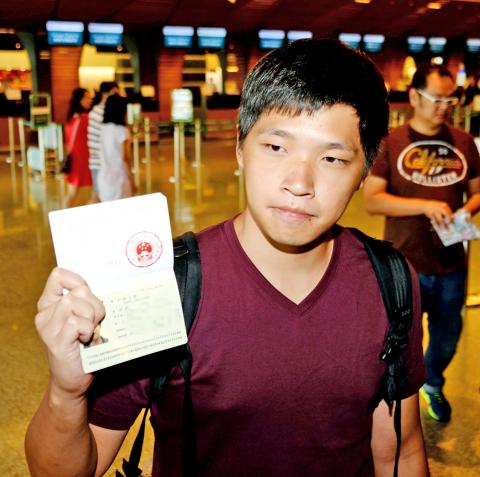Sunflower movement leader Chen Wei-ting (陳為廷) was denied entry to Hong Kong yesterday after he tried to go to the former British colony to participate in the pro-democracy movement there.
After returning to Taiwan Taoyuan International Airport, Chen recounted his experience, saying that immigration officers had taken him aside while he was passing through customs at Hong Kong International Airport and led him to a small room.
Chen said the officials told him that his “Taiwan compatriot’s travel document” (台胞證) — a permit issued by Chinese authorities allowing Taiwanese to travel to China that can also be used to enter Hong Kong — had been nullified.

Photo: CNA
However, Chen said the document was not due to expire until 2018.
The Sunflower leader said the officials searched him, which added to his feeling that he was being treated like a terrorist.
He was then escorted by the officers onto a flight bound for Taiwan that departed at 5:45pm and arrived at Taoyuan International Airport at about 7:30pm.
Prior to departing from the Taoyuan airport at 2pm yesterday, Chen said he was going to Hong Kong to join in activists’ fight for democracy.
“I hope that Beijing and the Hong Kong government will not try to block the interaction and exchanges between civic groups in Taiwan and in Hong Kong,” he said. “If Hong Kong decides to deport me, I will have no choice but to come back, but I’d like to see how the Mainland Affairs Council will react, since it once said that it would try to give me a hand in such matters.”
Chen was referring to Hong Kong authorities’ denial of visa applications filed by himself and his fellow Taiwan March cofounders Lin Fei-fan (林飛帆) and Huang Kuo-chang (黃國昌) last week.
The trio had intended to join pro-democracy demonstrations taking place in the territory.
Despite their failure to get visas, Chen decided to travel to Hong Kong anyway using his “Taiwan compatriot’s travel document.”
Lin and Huang could not accompany him, as they do not have the travel permit.
Chinese dissident Wang Dan (王丹), who is living in exile in Taiwan, expressed support for Chen’s efforts on Facebook, writing: “Although he was denied a visa, Chen still decided to go to Hong Kong [yesterday]. He may not be allowed into Hong Kong, but our friends in Hong Kong should get a clear message: Those who participated in Taiwan’s Sunflower movement will be standing firmly together with the force for democracy in Hong Kong.”
“The demonstration on July 1 [tomorrow] is coming — Hong Kongers, you are not alone,” Wang posted.
Additional reporting by Yao Chi-hsiu

Seventy percent of middle and elementary schools now conduct English classes entirely in English, the Ministry of Education said, as it encourages schools nationwide to adopt this practice Minister of Education (MOE) Cheng Ying-yao (鄭英耀) is scheduled to present a report on the government’s bilingual education policy to the Legislative Yuan’s Education and Culture Committee today. The report would outline strategies aimed at expanding access to education, reducing regional disparities and improving talent cultivation. Implementation of bilingual education policies has varied across local governments, occasionally drawing public criticism. For example, some schools have required teachers of non-English subjects to pass English proficiency

‘FORM OF PROTEST’: The German Institute Taipei said it was ‘shocked’ to see Nazi symbolism used in connection with political aims as it condemned the incident Sung Chien-liang (宋建樑), who led efforts to recall Democratic Progressive Party (DPP) Legislator Lee Kun-cheng (李坤城), was released on bail of NT$80,000 yesterday amid an outcry over a Nazi armband he wore to questioning the night before. Sung arrived at the New Taipei City District Prosecutors’ Office for questioning in a recall petition forgery case on Tuesday night wearing a red armband bearing a swastika, carrying a copy of Adolf Hitler’s Mein Kampf and giving a Nazi salute. Sung left the building at 1:15am without the armband and apparently covering the book with a coat. This is a serious international scandal and Chinese

TRADE: The premier pledged safeguards on ‘Made in Taiwan’ labeling, anti-dumping measures and stricter export controls to strengthen its position in trade talks Products labeled “made in Taiwan” must be genuinely made in Taiwan, Premier Cho Jung-tai (卓榮泰) said yesterday, vowing to enforce strict safeguards against “origin laundering” and initiate anti-dumping investigations to prevent China dumping its products in Taiwan. Cho made the remarks in a discussion session with representatives from industries in Kaohsiung. In response to the US government’s recent announcement of “reciprocal” tariffs on its trading partners, President William Lai (賴清德) and Cho last week began a series of consultations with industry leaders nationwide to gather feedback and address concerns. Taiwanese and US officials held a videoconference on Friday evening to discuss the

PERSONAL DATA: The implicated KMT members allegedly compiled their petitions by copying names from party lists without the consent of the people concerned Judicial authorities searched six locations yesterday and questioned six people, including one elderly Chinese Nationalist Party (KMT) member and five KMT Youth League associates, about alleged signature forgery and fraud relating to their recall efforts against two Democratic Progressive Party (DPP) legislators. After launching a probe into alleged signature forgery and related fraud in the KMT’s recall effort, prosecutors received a number of complaints, including about one petition that had 1,748 signatures of voters whose family members said they had already passed away, and also voters who said they did not approve the use of their name, Taipei Deputy Chief Prosecutor